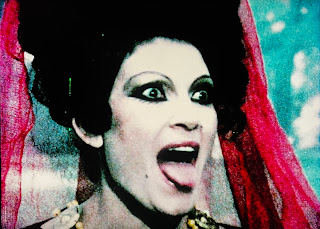"A City That's Sad and Beautiful, for All It Stands For Is Folly"
A set can be set anywhere. Anyone might wander onto it. Even crazy hippies. Fellini invites them all in; this subculture has adapted to his predilections. "I live in a city that's called 'Mastorna'. It's a fool's dream laid out here in a field." So have the sets of the production adapted, those for his abandoned movie Il viaggio di G. Mastorna [G. Mastorna's Journey]. They resemble the unfinished structures of 8-1/2. A jet-liner sits dormant, a take-off waiting to happen. A ghost-ship. This is Fellini: A Director's Notebook [1969], a picture he made initially for television broadcast, paid for by NBC; the voice-over and language all Fellini's heavily-accented English. It is one of the two or three craziest 'TV movies' ever to air on American network television, or at least as was intended to. It might have broadcast only in Italy?
Check out the letter Fellini wrote to the producer Peter Goldfarb.
I'd wager Fellini: A Director's Notebook probably would have been at least as interesting as Il viaggio di G. Mastorna. All the films that were never made... Some of us can't help but fetishize those unrealized projects. I remember flipping through the Fellini section in the stacks of a library at my college and upon discovering that G. Mastorna was a film that the director wanted to make but hadn't, I could have sworn the earth stopped turning. I saw images of the sets, but really didn't take in that they'd be sitting there for years, all overgrown and landlocked on the De Laurentiis backlot. It's there in full decadence in Fellini: A Director's Notebook, in which Federico admits "[Mastorna] is the story I prefer the most," while at the same time breaking through to a new approach to an episodic narrative structure that will underpin the near-simultaneous project Fellini-Satyricon [1969]. Fellini will describe that viaggio as: "Another voyage — a voyage in time."
Past and present mingle on the subway beneath Roma; within the remark that "These girls are easily transformed into their ancient counterparts, who also hung around this area"; in the soldier get-ups the truckers suddenly find themselves sporting. The inverse: Fellini's production office, the most fluorescent antiseptic space, headshots pinned on corkboards, those soliciting roles that hit the mark of the Fellini-type but betray an otherwise ersatz desperation: a difference between that pedigree of freak, and the on-camera ham-cum-hanger-on.
"What is the difference between a Latin woman and a northern woman?"
"I don't know, many things — the smell, perhaps." •

























No comments:
Post a Comment
Note: Only a member of this blog may post a comment.